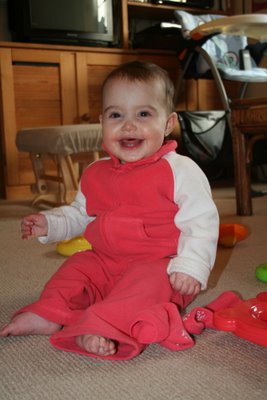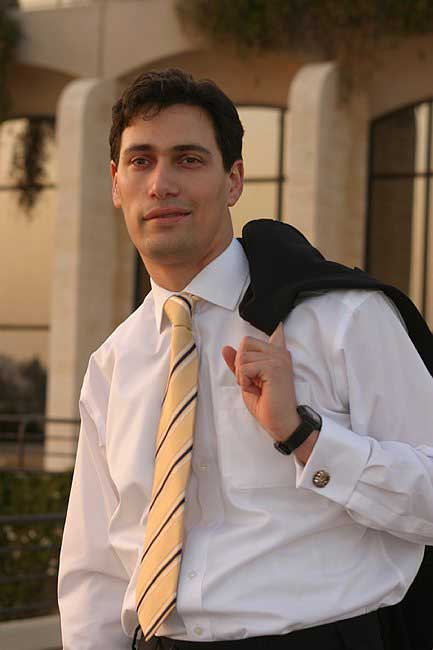Reflections on the Simchat Bat
 Eliana is nearly ten months old. I can't quite believe it! Here is an article I recently wrote about naming our daughter....
Eliana is nearly ten months old. I can't quite believe it! Here is an article I recently wrote about naming our daughter....They say that nothing can prepare you for the birth of a new child. Well, we certainly tried as best we could. We read all the childcare books, spent lots of time with our friends who have kids, bought all the baby equipment, and went on a childbirth course. We even popped into the children’s service!
But nothing prepared us for Eliana’s early arrival one Friday afternoon in mid July! My wife had just started her maternity leave that same day, and her parents had not even arrived from abroad. In fact, Eliana was born so quickly, I didn’t have a chance to park the car. I left it at the entrance to the hospital with a message on the dashboard saying “wife gone into labour, back soon” – three hours later, the car was still there, without so much as a parking ticket! Who says miracles don’t happen?
Having a baby changes your life in obvious ways, nappy changing, sleep deprivation, (and financial deprivation!). But there are more subtle ways in which your life changes. You have to start making decisions about what you want for your children, how to bring them up, what schools to send them to and how to commemorate the major events in their life.
One of the first decisions we had to make was how and where to name our daughter. Compared to boys, daughters’ births are not always celebrated in a big way – on the contrary, in some circles they are seen as a misfortune. In recent years, all this has changed as an increasing number of Jewish families of all denominations have been holding baby naming ceremonies for their daughters. Whilst some have dismissed the Simchat Bat as some kind of fangled new age creation, it actually has some basis in Jewish tradition.
There is no explicit source in the Mishnah or Talmud which teaches us when boys or girls were named, but by the medieval period, there apparently was a time period after which a baby girl or baby boy should be named, the period for girl was called the Shavua Habat while the name of the period for the boy was called the Shavua Haben. The term Shavua Haben “the week of the son” appears as the name of a birth celebration in several places in rabbinic literature (e.g. Sanhedrin 32b). Rashi and others assumed that it means the brit milah, but this is surprising since the brit occurs on the eighth day and not on the seventh.
This interpretation is also contradicted by a source quoted by Nachmanides about which event takes precedence over another: “and in another version of [ Massekhet Semahot ] it is taught: Shavua Habat [= the week of the daughter] and Shavua Haben – Shavua Haben comes first”.
In other words, if you have to choose between going to Shavua Haben or Shavua Habat , the former takes precedence. It is clear from this source that Shavua Haben is not a brit , because girls do not have a brit !
In early medieval German Jewish communities a baby naming ceremony was developed for both girls and boys called the Hollekreisch.
It took place on the first Shabbat when the mother went to the synagogue, which was on the fourth Shabbat or on the thirtieth day after the birth. It took place after Shabbat lunch. Boys recited the Hollekreisch for boys and girls for girls. The newborn children were dressed up; baby boys were dressed in a tallit and the book of Vayikra (Leviticus) was placed in the crib. Then, they would lift up the crib and shout in German:
“Hollekreisch! How shall the baby be called? Ploni Ploni Ploni (i.e. his or her name three times)”.
This was repeated three times and then nuts, sweets and fruits were given to the boys and girls.
Originally, this was the German custom for both boys and girls. In time, they stopped performing the ceremony for boys, since they were named in any case at the brit , and they observed it only for girls. Rabbi Yaakov Emden (d. 1776) says there was not a fixed custom to recite the verses for girls. Girls received a Hebrew name or a secular name at the Hollekreisch.
More recently, Iraqi Jews have celebrated a Shisha festival on the sixth night after birth for boys and girls. At that festival, girls receive their names. In other words, the festival is identical for boys and girls except that girls are named at the Shisha , while boys are named at the brit. The same may have been true for Shavua Haben/Shavua Habat . A festival may have been held for boys and girls on the seventh day, except that girls were named then, while boys were named at the brit.
Today, the celebration typically consists of a communal welcoming, a naming done over a cup of wine with the quotation of appropriate biblical verses, and traditional blessings. At this point, one of the parents will give a devar torah and explain to the community how they chose their daughters name.
In the Sephardi community, a zeved habat is held, This ceremony is usually celebrated within the first month of the girl's birth and may be celebrated privately in the synagogue or in a party at home. The ceremony will often be lead by the Rabbi or the Hazzan.
The main elements of the ceremony are the mother's thanksgiving for deliverance (Birkat gomel); the recital of Song of Songs 2:14 (and, in the case of the first daughter born to the mother, Song of Songs 6:9); and the name giving prayer itself in the form of Mi sheberakh. Additional elements may include Psalm 128 and the Priestly Blessing (Birkat kohanim).
When my wife was born, her parents held a Kiddush in her honour. The Rabbi giving a speech stood up, and said…. “Don’t worry, it will be okay, next time it will be a boy!”. I’m glad to say we’ve moved on a bit since then a bit since then!


<< Home